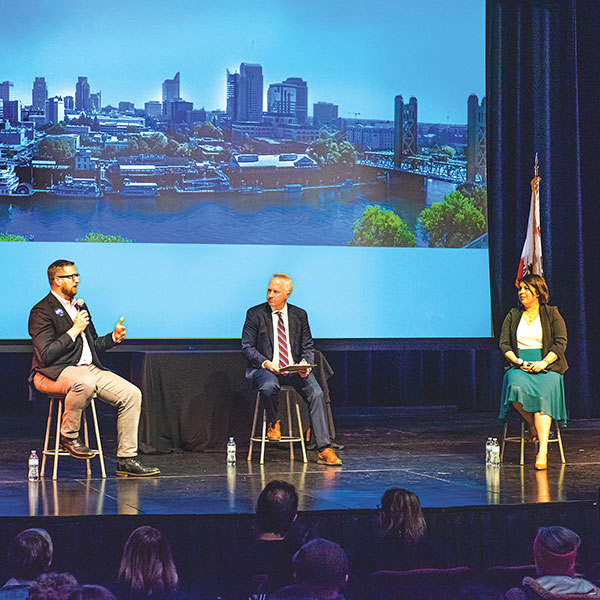Local Anesthetic
How councilmembers rule their roosts
By R.E. Graswich
March 2020
The council, which includes eight district representatives and the mayor, is supposed to be collaborative and democratic. But City Hall tradition allows councilmembers to act as rulers of their own little kingdoms—especially if they want to kill something.

If a councilmember doesn’t support a plan in his or her district, it has a near-zero chance of happening. The opposite is also true.
In Pocket and Greenhaven, Councilmember Rick Jennings decided to finish the Sacramento River Parkway atop the river levee. “We have to keep the promise that the city made to the community in 1975 and finish this trail,” he says.
It took five years to pull together the funds, but once Jennings let his City Council colleagues know he wanted to complete the levee project, he had their support.
Why did it take the council 40 years to act on the river parkway? Simple: Two earlier Pocket councilmembers—Lynn Robie and Robbie Waters—didn’t want to upset property owners along the levee. They buried the parkway plan.
Armed with political influence, riverfront homeowners blocked public access to the city’s greatest natural resource for four decades. Local councilmembers supported the property owners by ignoring the city’s promise to finish the parkway.
It took a one-term councilmember, Darrell Fong, to finally say enough’s enough, let’s get the parkway built. When Jenkins replaced Fong in 2014, he followed Fong’s lead and pushed for the long-overdue project.
From there, Jennings’ enthusiasm pushed the City Council forward.
Now residents are watching the bad old process repeat itself in Little Pocket. That’s where Councilmember Steve Hansen, collaborating with about 40 riverfront homeowners, has blocked completion of a one-mile stretch of the river parkway.
Hansen won’t reveal his true motives. But he acts like a lawyer for the 40 or so homeowners. He prevents the greater community from enjoying river access.
Meantime, the rest of the City Council does nothing—thanks to the tradition of local lordship.
Even though the council (Hansen included) unanimously supported Jennings’ river access plans in Pocket and Greenhaven, councilmembers won’t challenge Hansen in Little Pocket. They won’t help his district unless Hansen wants help. He doesn’t.
That’s why public access to the river in Little Pocket is stalled until Hansen exits the City Council.
There are rare exceptions to the local lordship rule. Last summer, Meadowview Councilmember Larry Carr furiously argued against the presence of a homeless shelter in his district across from the Pannell Community Center.
Pressured by Mayor Darrell Steinberg, the council majority ignored Carr and approved the shelter. The council knew Carr was a lame duck—he already said he would not run for re-election. His opinions ceased to count.
In 2014, Councilmember Steve Cohn lost an important vote in his East Sacramento district. He opposed plans for McKinley Village, a new subdivision, but the council approved the development anyway. Cohn left the council months later to run for the state Assembly. He lost to fellow Councilman Kevin McCarty.
Cohn almost lost another big East Sac development vote in 2007, when he expressed concerns over the expansion of Mercy General Hospital. He ultimately joined the majority and approved the project after the hospital promised to make its new cardiac wing more pedestrian friendly.
McKinley Village and Mercy Hospital were big deals. The shelter in Meadowview was consumed by Steinberg’s promises to resolve the homeless crisis. With smaller, less controversial projects, such as the river levee parkway, the council falls back on tradition.
That’s how two councilmembers—Robie and Waters—whose tenures spanned 29 years, managed to keep the City Council from completing the river parkway promised in 1975. And how Hansen manages to block public access to the river in Little Pocket today.
R.E. Graswich can be reached at regraswich@icloud.com. Follow us on Facebook, Twitter and Instagram: @insidesacramento.com
















